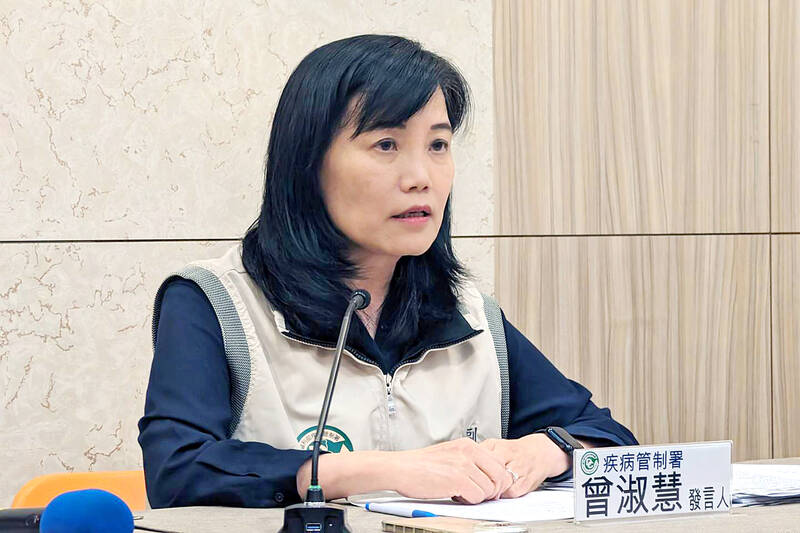The Centers for Disease Control (CDC) yesterday reported this year’s first two cases of Japanese encephalitis, including a person who died nine days after showing symptoms, and urged people to take precautionary measures against mosquito bites.
One of the cases is a man in his 60s, who lived in Kaohsiung’s Gangshan District (岡山), the centers said, adding that the man was hospitalized for upper stomach pain on May 4, and developed a fever on Monday last week.
The man developed symptoms including a stiff neck, facial palsy, difficulty in swallowing, hearing loss and altered consciousness on Thursday last week, so the hospital reported him as a suspected Japanese encephalitis case, the CDC said.

Photo: CNA
The man’s test results came back positive, and his condition worsened and he died on Sunday, it said.
The other case is a woman in her 70s, who lives in Kaohsiung’s Zuoying District (左營), and had sought medical treatment for a fever, sore throat, vomiting and dizziness on Monday last week, the centers said.
She was rushed to an emergency room the next day for symptoms of tremors, slow speech and altered consciousness, it said.
The woman tested positive for Japanese encephalitis and remains hospitalized, it added.
CDC Deputy Director-General Tseng Shu-hui (曾淑慧) said the Japanese encephalitis virus is transmitted to humans through being bitten by infected Culex mosquitoes, mainly Culex tritaeniorhynchus, Culex annulus Theobald and Culex fuscocephala Theobald.
These mosquitoes are often found in rice fields, ponds and irrigation ditches, and tend to be more active at dawn and dusk, she said.
Most people infected with the virus have mild or no symptoms, but a few develop a headache and fever, and could also develop severe symptoms such as disorientation, coma, seizures, spastic paralysis and death, the CDC said.
The two cases were not vaccinated and mainly stayed near their homes before showing symptoms, but there are pigeon nests, pig farms and rice fields nearby, which are high-risk environments, Tseng said.
The local health department has placed mosquito lamps at the pig farms in the area, enhanced disease awareness promotion in the neighborhood, and asked local medical facilities to remain vigilant and report suspected cases, she said.
Japanese encephalitis season in Taiwan is from May to October and peaks in June or July, CDC data showed.
Although the majority of patients in Taiwan are adults aged 40 or older, people of any age might develop symptoms, data showed.
Getting vaccinated is an effective way of preventing Japanese encephalitis, and it is included in the routine vaccinations for children, so parents should get their children vaccinated according to the recommended schedule, the CDC said.
The first dose of Japanese encephalitis vaccine is recommended when infants reach 15 months old, and a second dose should follow 12 months later, it said.
Adults can also get the vaccine paid out-of-pocket at designated hospitals, it said.
People should take precautionary measures against mosquito bites by avoiding visiting high-risk environments at dawn and dusk; wearing loose-fitting, long-sleeved shirts and pants; and using government-approved mosquito repellents that include diethyltoluamide, picaridin or ethyl butylacetylaminopropionate, it added.

CAUTION: Based on intelligence from the nation’s security agencies, MOFA has cautioned Taiwanese travelers about heightened safety risks in China-friendly countries The Ministry of Foreign Affairs (MOFA) yesterday urged Taiwanese to be aware of their safety when traveling abroad, especially in countries that are friendly to China. China in June last year issued 22 guidelines that allow its courts to try in absentia and sentence to death so-called “diehard” Taiwanese independence activists, even though Chinese courts have no jurisdiction in Taiwan. Late last month, a senior Chinese official gave closed-door instructions to state security units to implement the guidelines in countries friendly to China, a government memo and a senior Taiwan security official said, based on information gathered by Taiwan’s intelligence agency. The

The National Immigration Agency (NIA) said yesterday that it will revoke the dependent-based residence permit of a Chinese social media influencer who reportedly “openly advocated for [China’s] unification through military force” with Taiwan. The Chinese national, identified by her surname Liu (劉), will have her residence permit revoked in accordance with Article 14 of the “Measures for the permission of family- based residence, long-term residence and settlement of people from the Mainland Area in the Taiwan Area,” the NIA said in a news release. The agency explained it received reports that Liu made “unifying Taiwan through military force” statements on her online

Taiwan Semiconductor Manufacturing Co (TSMC), the world’s largest contract chipmaker, said yesterday that it is looking to hire 8,000 people this year, at a time when the tech giant is expanding production capacity to maintain its lead over competitors. To attract talent, TSMC would launch a large-scale recruitment campaign on campuses across Taiwan, where a newly recruited engineer with a master’s degree could expect to receive an average salary of NT$2.2 million (US$60,912), which is much higher than the 2023 national average of NT$709,000 for those in the same category, according to government statistics. TSMC, which accounted for more than 60 percent

A magnitude 5.7 earthquake struck off Taitung County at 1:09pm today, the Central Weather Administration (CWA) said. The hypocenter was 53km northeast of Taitung County Hall at a depth of 12.5km, CWA data showed. The intensity of the quake, which gauges the actual effect of a seismic event, measured 4 in Taitung County and Hualien County on Taiwan's seven-tier intensity scale, the data showed. The quake had an intensity of 3 in Nantou County, Chiayi County, Yunlin County, Kaohsiung and Tainan, the data showed. There were no immediate reports of damage following the quake.